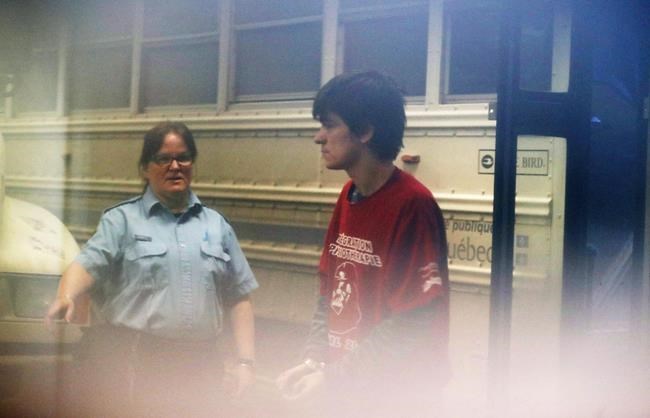
Alexandre Bissonnette, a suspect in a shooting at a Quebec City mosque, arrives at the court house in Quebec City on February 21, 2017. THE CANADIAN PRESS/Mathieu Belanger - POOL
Republished January 26, 2020 - 12:15 PM
Original Publication Date January 26, 2020 - 10:21 AM
MONTREAL - Nearly three years after the massacre that claimed six lives at the Quebec City mosque, the length of the sentence imposed on the man convicted of the crimes will be debated in the province's highest court Monday.
Lawyers for Alexandre Bissonnette and the Crown will be at the Quebec Court of Appeal to make legal arguments.
There was no trial as Bissonnette pleaded guilty in March 2018 to all charges against him, including six counts of first-degree murder and six of attempted murder after he walked into the mosque at the Islamic Cultural Centre on Jan. 29, 2017 with two firearms and opened fire during evening prayers.
The slain men were Mamadou Tanou Barry, 42; Abdelkrim Hassane, 41; Khaled Belkacemi, 60; Aboubaker Thabti, 44; Azzeddine Soufiane, 57; and Ibrahima Barry, 39.
Bissonnette was automatically sentenced to life in prison with the only issue being the amount of time he'd have to serve behind bars before being eligible for parole.
Quebec Superior Court Justice Francois Huot ultimately sentenced Bissonnette last year to 40 years behind bars — the harshest prison term ever in Quebec and one of the longest in Canada, which has permitted consecutive life sentences since a 2011 Criminal Code reform allowed for it.
Huot opted for life imprisonment without the possibility of parole for 40 years, saying that a sentence beyond life expectancy would have been "absurd" and a charter violation.
But neither the defence or the Crown were pleased with the outcome.
Bissonnette's attorneys appealed his sentence, calling the four decade prison term "unreasonable."
The Crown and Quebec's attorney general also want the sentence changed — arguing in favour of a 50-year prison term.
From the Crown's perspective, the sentence imposed did not reflect the severity of the offences or the respondent's degree of responsibility, which it qualified as "exceptionally high."
For Bissonnette, his lawyers argue being allowed to apply for parole after serving 25 years would be just.
Having admitted to the crimes, Bissonnette's attorneys have argued the length of time to be served should be in accordance with the principles of Canadian law.
Monday's hearing comes on the same week as the third anniversary of the shooting Wednesday.
Boufeldja Benabdallah, president of the mosque that was attacked, said many of the victims and the city's Muslim community will be following the proceedings carefully.
However, unlike a year ago, when he expressed his disappointment at what he described as a too-lenient sentence, he said he had no desire to get involved in a debate about the sentencing.
"Now, it's been a year (since the sentencing) and we are resting and will let justice take its course," he said.
Benabdallah said the mosque community has had many "highs and lows" in the three years since the shooting, but overall things are better than they were.
"People have returned to work people are educating their children, families are finding a little bit of serenity," he said.
As positives, he cites the announcement late last year of the creation of Quebec City's first Islamic cemetery, as well as long-planned renovations to the mosque to enlarge it and make it safer.
The negatives include Quebec's secularism law which bans some civil servants from wearing religious symbols at work — something he says targets Muslims in particular and makes them feel "like a minority and targeted."
"As much as we're advancing on a social level, there's been on the political and administrative level a step back," he said.
At the heart of the legal debate is a constitutional fight applying to the section of the Criminal Code that applies to multiple murders.
The Montreal Defence Lawyers Association has been granted intervenor status in the appeal and will argue that the Criminal Code contravenes the Charter of Rights and Freedoms by allowing judges to stack life sentences for multiple murders instead imposing them concurrently.
The legal debate is one that will be followed closely by criminal attorneys and judges right across the country.
Section 745.51 of the Criminal Code provides for the possibility of consecutive sentences in the case of multiple murders — 25 years in person for each crime.
In the Quebec case, the Crown opted to use it and had requested a 150-year prison sentence — 25 years for each of the six victims.
The association argues that sentences exceeding life expectancy with no review mechanism is "inconsistent with human dignity'' and a violation of Section 12 of the charter, which grants protection from cruel and unusual punishment.
This report by The Canadian Press was first published Jan. 26, 2020.
- With files from Morgan Lowrie
News from © The Canadian Press, 2020